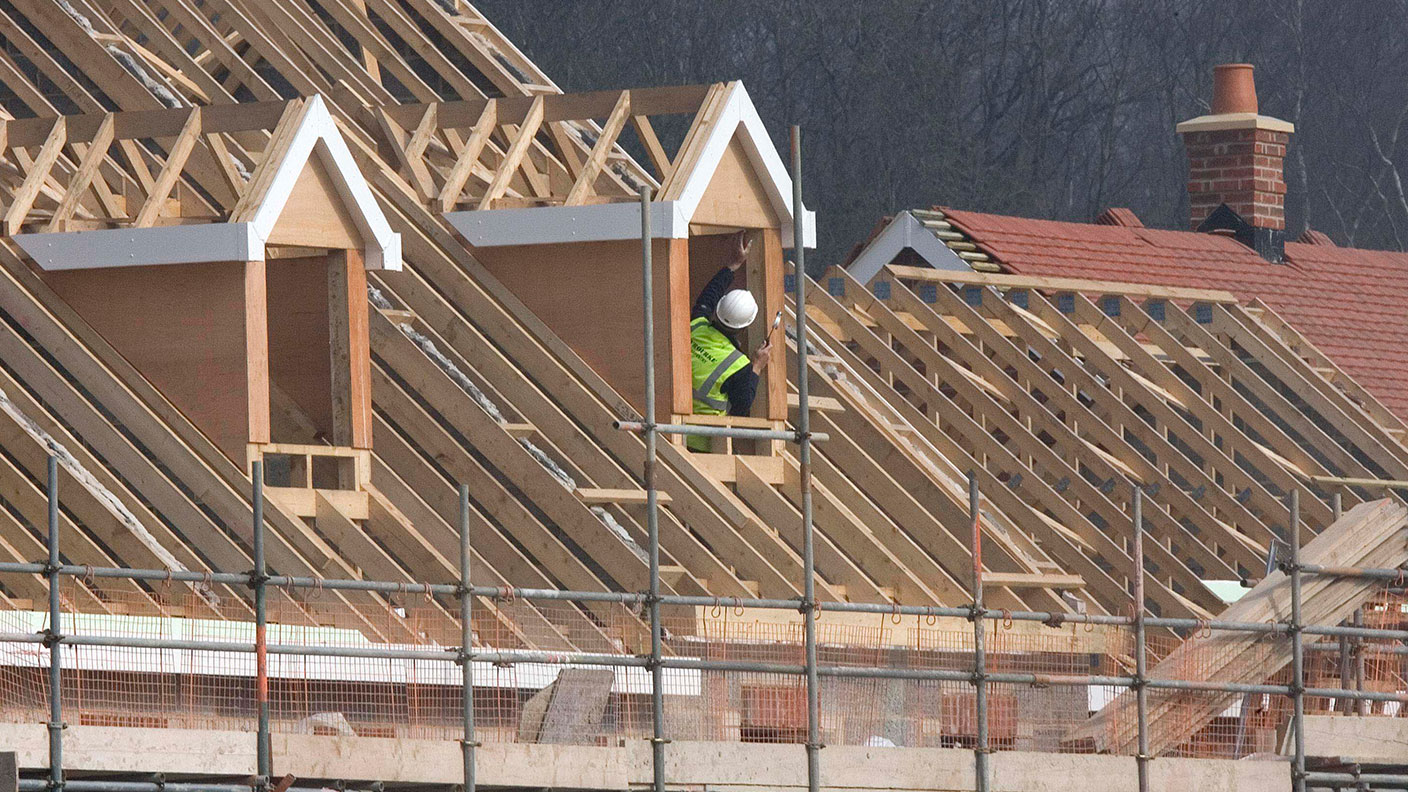House prices are soaring – here are the best housebuilders to buy to profit
Demand for housing in the UK continues to outstrip supply – that’s good for the nation’s housebuilders. Rupert Hargreaves picks the best buys in the sector.


Get the latest financial news, insights and expert analysis from our award-winning MoneyWeek team, to help you understand what really matters when it comes to your finances.
You are now subscribed
Your newsletter sign-up was successful
Want to add more newsletters?

Twice daily
MoneyWeek
Get the latest financial news, insights and expert analysis from our award-winning MoneyWeek team, to help you understand what really matters when it comes to your finances.

Four times a week
Look After My Bills
Sign up to our free money-saving newsletter, filled with the latest news and expert advice to help you find the best tips and deals for managing your bills. Start saving today!
House prices are soaring and as demand for homes continues to outpace supply – and the Bank of England appears to have mixed feelings about raising interest rates much further – there’s no indication this trend will come to an end.
In its latest trading update, Taylor Wimpey (LSE: TW) declared that despite the recent increase in interest rates from 0.5% to 0.75%, customer appetite remains strong and “healthy levels of house price growth” are offsetting labour and material cost inflation. Excluding legal completions, the company’s order book stood at £2,972m in mid-April, compared to £2,808m a year ago.
Supply is not matching up to demand
The government estimates that the UK needs to build 300,000 new homes a year to keep up with demand, but the country has consistently missed this target, with output averaging around 250,000 a year.
MoneyWeek
Subscribe to MoneyWeek today and get your first six magazine issues absolutely FREE

Sign up to Money Morning
Don't miss the latest investment and personal finances news, market analysis, plus money-saving tips with our free twice-daily newsletter
Don't miss the latest investment and personal finances news, market analysis, plus money-saving tips with our free twice-daily newsletter
Of course, supply and demand are not the only factors that influence the housing market. Interest rates and affordability are also key. And here the picture appears a bit more uncertain. UK housing affordability is near record lows while interest rates are on the up.
Taylor Wimpey might not have noticed a drop in demand after the Bank of England raised rates to 0.75%, but that could quickly change if rates jump to 2% or more as some analysts are projecting.
As well as these cracks, building costs are also rising, hitting margins, and these firms are having to set aside billions to cover the cost of dealing with cladding on old buildings. All of these challenges are bringing back bad memories of the financial crisis when hundreds of overleveraged home builders collapsed as the bottom fell out of the housing market.
Is the housing market heading for a crash?
As concerns have grown, investors have jumped ship. The sector is trading at an average forward price/earnings (p/e) ratio of around eight, compared to the FTSE All-Share average of 13.7, reflecting the market’s view that these businesses are facing serious challenges.
Still, trying to predict house prices over the long run is notoriously difficult. Housing affordability has been falling for the past four decades, yet prices have continued to march higher. What’s more, none of the major housebuilders are anywhere near as leveraged as they were heading into 2008.
At the end of 2021, Taylor Wimpey reported a net cash balance of £810m or 22p per share. Barratt Developments’ (LSE: BDEV) cash balance stood at £1.1bn (110p per share), Berkeley (LSE: BKG) held cash reserves of £846m (733p per share) while Bellway (LSE: BWY) and Persimmon (LSE: PSN) recorded cash balances of £200m (161p per share) and £1.2bn (320p per share) respectively.
While these figures will change due to working capital flows and the timing of dividend payouts, they clearly show that the sector is financially resilient. If house prices fall and the market freezes over, they should be able to adjust to the new normal.
In my opinion, these reserves take the worst-case scenario off the table, limiting the overall downside risk. It’s highly unlikely any one of these equities would fall below the value of the cash on the balance sheet – that’s without giving any attention to their land portfolios.
The cheapest of the lot, and the company with the largest cash reserves is Barratt. The stock is trading at a forward p/e of 6.4 – or five after deducting cash. Taylor Wimpey and Bellway come in second, selling at a cash-adjusted p/e of 5.8 and 5.9 respectively.
Persimmon and Berkeley are the most expensive of the bunch. These businesses are selling at ex-cash multiples of 7.4 and 8.8.
There is no denying the UK housing market is facing an uncertain future, but there is no guarantee the market is heading for a downturn either. Investors seem to be preparing for the worst, but if the worst never happens, Barratt, Taylor Wimpey and Bellway look dirt cheap. If the market does crash, their cash reserves should protect these companies from the worst.
- Homebuilders look cheap, but this is a better bet on the UK housing market
- UK house prices are rising at the fastest rate in 17 years. How?!
Get the latest financial news, insights and expert analysis from our award-winning MoneyWeek team, to help you understand what really matters when it comes to your finances.

Rupert is the former deputy digital editor of MoneyWeek. He's an active investor and has always been fascinated by the world of business and investing. His style has been heavily influenced by US investors Warren Buffett and Philip Carret. He is always looking for high-quality growth opportunities trading at a reasonable price, preferring cash generative businesses with strong balance sheets over blue-sky growth stocks.
Rupert has written for many UK and international publications including the Motley Fool, Gurufocus and ValueWalk, aimed at a range of readers; from the first timers to experienced high-net-worth individuals. Rupert has also founded and managed several businesses, including the New York-based hedge fund newsletter, Hidden Value Stocks. He has written over 20 ebooks and appeared as an expert commentator on the BBC World Service.
-
 Early signs of the AI apocalypse?
Early signs of the AI apocalypse?Uncertainty is rife as investors question what the impact of AI will be.
-
 Reach for the stars to boost Britain's space industry
Reach for the stars to boost Britain's space industryopinion We can’t afford to neglect Britain's space industry. Unfortunately, the government is taking completely the wrong approach, says Matthew Lynn
-
 Buying vs renting: is is better to own or rent your home?
Buying vs renting: is is better to own or rent your home?The higher mortgage rates of recent years have actually made renting comparatively cheaper, analysis suggests. But there are hidden costs to long term renting.
-
 Bank of England resolves payments issue that threatened home sales
Bank of England resolves payments issue that threatened home salesNews Homebuyers and sellers faced an anxious wait for funds to clear on property transactions today due to issues hitting the Bank's CHAPS service.
-
 Halifax: House price slump continues as prices slide for the sixth consecutive month
Halifax: House price slump continues as prices slide for the sixth consecutive monthUK house prices fell again in September as buyers returned, but the slowdown was not as fast as anticipated, latest Halifax data shows. Where are house prices falling the most?
-
 Rents hit a record high - but is the opportunity for buy-to-let investors still strong?
Rents hit a record high - but is the opportunity for buy-to-let investors still strong?UK rent prices have hit a record high with the average hitting over £1,200 a month says Rightmove. Are there still opportunities in buy-to-let?
-
 Where to find the best returns from student accommodation
Where to find the best returns from student accommodationStudent accommodation can be a lucrative investment if you know where to look.
-
 Revealed: the cheapest cities to own a home in Britain
Revealed: the cheapest cities to own a home in BritainNew research reveals the cheapest cities to own a home, taking account of mortgage payments, utility bills and council tax
-
 Buy-to-let returns fall 59% amid higher mortgage rates
Buy-to-let returns fall 59% amid higher mortgage ratesBuy-to-let returns are slumping as the cost of borrowing spirals.
-
 North outperforming the South for property investors
North outperforming the South for property investorsThe property market in the North of England is outperforming the South for both capital appreciation and rental yields.